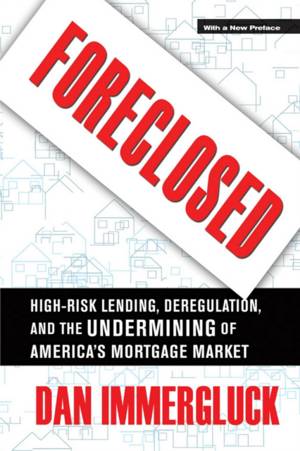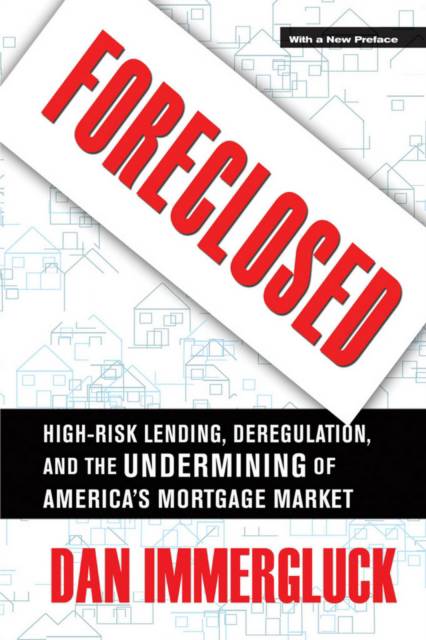
- Afhalen na 1 uur in een winkel met voorraad
- Gratis thuislevering in België vanaf € 30
- Ruim aanbod met 7 miljoen producten
- Afhalen na 1 uur in een winkel met voorraad
- Gratis thuislevering in België vanaf € 30
- Ruim aanbod met 7 miljoen producten
Foreclosed
High-Risk Lending, Deregulation, and the Undermining of America's Mortgage Market
Daniel ImmergluckOmschrijving
Over the last two years, the United States has observed, with some horror, the explosion and collapse of entire segments of the housing market, especially those driven by subprime and alternative or "exotic" home mortgage lending. The unfortunately timely Foreclosed explains the rise of high-risk lending and why these newer types of loans--and their associated regulatory infrastructure--failed in substantial ways. Dan Immergluck narrates the boom in subprime and exotic loans, recounting how financial innovations and deregulation facilitated excessive risk-taking, and how these loans have harmed different populations and communities.
Immergluck, who has been working, researching, and writing on issues tied to housing finance and neighborhood change for almost twenty years, has an intimate knowledge of the promotion of homeownership and the history of mortgages in the United States. The changes to the mortgage market over the past fifteen years--including the securitization of mortgages and the failure of regulators to maintain control over a much riskier array of mortgage products--led, he finds, inexorably to the current crisis.
After describing the development of generally stable and risk-limiting mortgage markets throughout much of the twentieth century, Foreclosed details how federal policy-makers failed to regulate the new high-risk lending markets that arose in the late 1990s and early 2000s. The book also examines federal, state, and local efforts to deal with the mortgage and foreclosure crisis of 2007 and 2008. Immergluck draws upon his wealth of experience to provide an overarching set of principles and a detailed set of policy recommendations for "righting the ship" of U.S. housing finance in ways that will promote affordable yet sustainable homeownership as an option for a broad set of households and communities.
Specificaties
Betrokkenen
- Auteur(s):
- Uitgeverij:
Inhoud
- Aantal bladzijden:
- 280
- Taal:
- Engels
Eigenschappen
- Productcode (EAN):
- 9780801477140
- Verschijningsdatum:
- 11/02/2011
- Uitvoering:
- Paperback
- Formaat:
- Trade paperback (VS)
- Afmetingen:
- 148 mm x 234 mm
- Gewicht:
- 381 g

Alleen bij Standaard Boekhandel
Beoordelingen
We publiceren alleen reviews die voldoen aan de voorwaarden voor reviews. Bekijk onze voorwaarden voor reviews.











